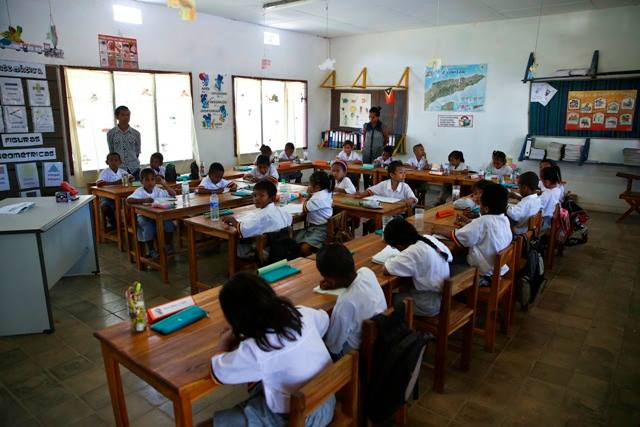In the vibrant heart of Mozambique’s capital, Maputo, there exists a linguistic and cultural phenomenon that reflects the rich heritage and dynamic nature of this East African nation. Lingua Maputo, a term that encompasses the diverse languages spoken in the city and the cultural interplay that defines it, stands as a testament to Mozambique’s multicultural identity. This article explores the significance of Lingua Maputo, its impact on local and national culture, and its role in shaping the future of Mozambique’s linguistic landscape.
The Linguistic Mosaic of Maputo
Maputo, the capital city of Mozambique, is a melting pot of languages and dialects. This linguistic diversity is a product of the country’s complex colonial history, its geographical positioning, and the vibrant interplay of its indigenous cultures. Lingua Maputo represents not just the multitude of languages spoken but also the socio-cultural interactions that occur within this urban environment.
Portuguese, Mozambique’s official language, is the primary language of administration, education, and media. It serves as a unifying medium across the diverse linguistic landscape of the country. However, in Maputo, Portuguese exists alongside a rich tapestry of local languages. These include Shangana, Ronga, and other Bantu languages, as well as Swahili and English, reflecting the city’s historical trade links and its role as a regional hub.
Shangana, a language of the Tsonga people, is particularly prevalent in Maputo. It is used in everyday conversations, cultural expressions, and traditional ceremonies. Similarly, Ronga, another Bantu language, is spoken by many residents and contributes to the city’s cultural fabric. The use of these languages in public spaces, markets, and homes highlights the deep connection between language and cultural identity in Maputo.
Cultural Significance of Lingua Maputo
Lingua Maputo is more than just a collection of languages; it is a reflection of the city’s cultural vibrancy. The interplay of different languages fosters a unique cultural atmosphere that is evident in various aspects of daily life in Maputo.
1. Music and Performing Arts: The city’s music scene is a prime example of Lingua Maputo’s cultural significance. Traditional Mozambican music, which often incorporates languages such as Shangana and Ronga, blends with contemporary genres to create a distinctive sound. Performances in local languages and the use of traditional instruments are integral to the cultural expression in Maputo. Festivals and music events showcase this fusion, celebrating both the city’s heritage and its modern influences.
2. Literature and Media: The literary landscape of Lingua Maputo reflects its linguistic diversity. Writers and poets use a variety of languages to capture the essence of Mozambican life and history. Local newspapers, radio stations, and television programs broadcast in Portuguese and indigenous languages, ensuring that a broad audience has access to information and entertainment. This multilingual media environment contributes to a rich cultural dialogue and promotes linguistic inclusivity.
3. Festivals and Celebrations: Maputo’s festivals and cultural events are a vibrant display of Lingua Maputo. Celebrations such as the Festival of the Indian Ocean and the Maputo Jazz Festival bring together artists, performers, and audiences from diverse linguistic backgrounds. These events not only highlight the city’s cultural diversity but also foster a sense of unity and shared identity among its residents.
Challenges and Opportunities
While Lingua Maputo is a testament to the city’s rich cultural tapestry, it also presents challenges and opportunities.
1. Language Preservation: The dominance of Portuguese and the influence of globalization pose challenges to the preservation of indigenous languages. Efforts to maintain and revitalize languages like Shangana and Ronga are crucial for preserving cultural heritage. Educational programs, community initiatives, and cultural organizations play a vital role in promoting and sustaining these languages.
2. Linguistic Inclusivity: The linguistic diversity of Maputo presents opportunities for fostering inclusivity and dialogue. By embracing and celebrating multiple languages, the city can create a more inclusive society where diverse linguistic and cultural identities are recognized and respected. Initiatives that promote multilingual education and cross-cultural understanding can contribute to a more cohesive community.
3. Economic and Social Impact: The cultural and linguistic diversity of Maputo has economic and social implications. The city’s rich cultural heritage attracts tourists and contributes to its vibrant arts scene. Promoting linguistic diversity can enhance cultural tourism and support local economies. Additionally, fostering a multilingual environment can improve social cohesion and contribute to the overall well-being of the community.
The Future of Lingua Maputo
Looking ahead, the future of Lingua Maputo will likely involve a continued celebration of its linguistic and cultural diversity. Efforts to promote and preserve indigenous languages, coupled with initiatives to enhance linguistic inclusivity, will play a crucial role in shaping the city’s cultural landscape.
As Mozambique continues to develop and modernize, the preservation of Lingua Maputo’s linguistic heritage will remain a priority. Embracing and celebrating the city’s multilingual identity can strengthen cultural connections and contribute to a more inclusive and vibrant society.
Conclusion
Lingua Maputo stands as a symbol of the rich cultural and linguistic heritage of Mozambique’s capital. The interplay of languages and cultures within the city reflects its dynamic history and vibrant present. As Maputo navigates the challenges and opportunities of the modern era, the preservation and celebration of its linguistic diversity will continue to be a cornerstone of its cultural identity. Through music, literature, festivals, and community initiatives, Lingua Maputo will remain a beacon of cultural richness and a testament to the power of language in shaping the fabric of urban life.
